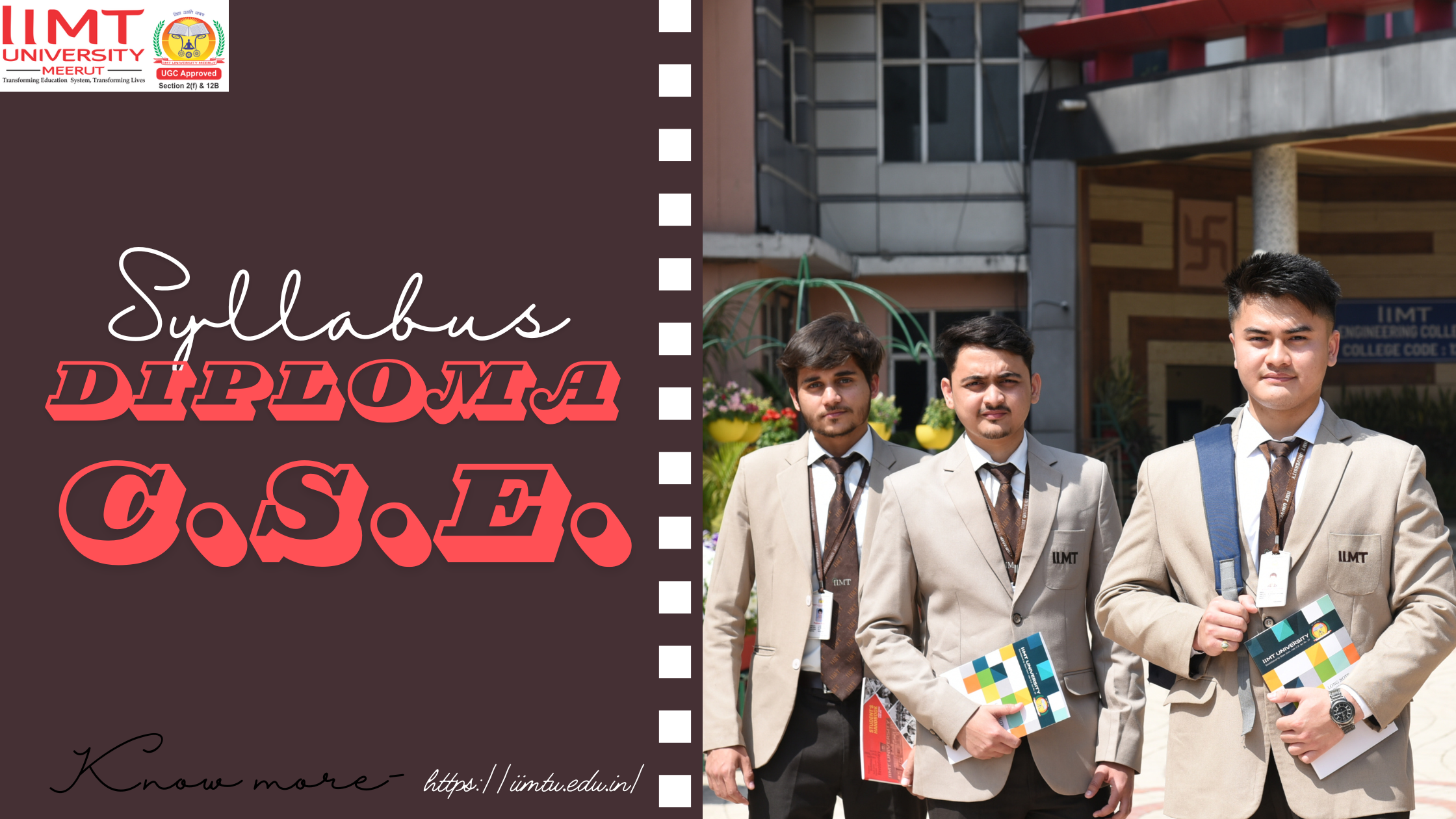Diploma in Computer Science and Engineering Syllabus
In today’s rapidly evolving technological landscape, obtaining a Diploma in Computer Science and Engineering (DCSE) offers a significant advantage. This diploma provides students with a comprehensive understanding of computer science fundamentals, engineering principles, and practical applications. This detailed guide outlines the syllabus for a Diploma in Computer Science and Engineering, emphasizing the key areas of study and essential skills that students will acquire throughout their education.
Overview of the Diploma in Computer Science and Engineering
The Diploma in Computer Science and Engineering is designed to equip students with the knowledge and skills necessary to thrive in the field of technology. This program typically spans three years and is divided into six semesters, each focusing on different aspects of computer science and engineering. The curriculum includes a mix of theoretical knowledge and practical training, preparing students for various roles in the tech industry.
Semester-Wise Breakdown of the diploma in computer science and engineering Syllabus :
Sem. 1: Foundations of Computer Science
- Mathematics for Computer Science
- Topics Covered: Set theory, algebra, probability, calculus, and discrete mathematics.
- Objective: To build a strong mathematical foundation essential for understanding computer algorithms and systems.
- Fundamentals of Information Technology
- Topics Covered: Introduction to computers, operating systems, software applications, and basic programming concepts.
- Objective: To familiarize students with the core components of IT and develop basic programming skills.
- Basic Electronics and Communication
- Topics Covered: Electronic components, circuit theory, digital electronics, and communication systems.
- Objective: To provide an understanding of electronic devices and their applications in computer systems.
- Technical English
- Topics Covered: Communication skills, technical writing, and presentation techniques.
- Objective: To enhance students’ ability to communicate technical information effectively.
Sem. 2: Core Computer Science Concepts
- Data Structures and Algorithms
- Topics Covered: Arrays, linked lists, stacks, queues, trees, graphs, sorting, and searching algorithms.
- Objective: To teach efficient data organization and manipulation techniques.
- Object-Oriented Programming
- Topics Covered: Principles of OOP, classes, objects, inheritance, polymorphism, and encapsulation using C++ or Java.
- Objective: To instill object-oriented design and programming skills.
- Digital Logic Design
- Topics Covered: Boolean algebra, logic gates, combinational and sequential circuits, and VHDL.
- Objective: To understand the design and functioning of digital systems.
- Computer Organization and Architecture
- Topics Covered: CPU architecture, memory hierarchy, input/output systems, and assembly language programming.
- Objective: To provide insights into the internal workings of computer systems.
Sem. 3: Advanced Programming and Databases
- Operating Systems
- Topics Covered: Process management, memory management, file systems, and security.
- Objective: To understand the functioning and management of modern operating systems.
- Database Management Systems
- Topics Covered: SQL, database design, normalization, transaction management, and NoSQL databases.
- Objective: To teach the principles of database design and management.
- Computer Networks
- Topics Covered: Network topologies, protocols, OSI model, TCP/IP, and network security.
- Objective: To provide a comprehensive understanding of network architecture and communication protocols.
- Web Technologies
- Topics Covered: HTML, CSS, JavaScript, web development frameworks, and web servers.
- Objective: To develop skills in building and managing dynamic web applications.
Sem. 4: Specialized Topics and Electives
- Software Engineering
- Topics Covered: Software development life cycle, methodologies, project management, and quality assurance.
- Objective: To understand the principles of software engineering and best practices in software development.
- Microprocessor and Microcontroller
- Topics Covered: 8085 and 8086 microprocessors, ARM microcontrollers, assembly language programming.
- Objective: To learn the architecture and programming of microprocessors and microcontrollers.
- Elective I (Choose one)
- Artificial Intelligence
- Cyber Security
- Data Science
- Objective: To provide specialized knowledge in a chosen area of computer science.
- Technical Seminar
- Topics Covered: Research and presentation on current trends and technologies in computer science.
- Objective: To develop research and presentation skills.
Sem. 5: Advanced Engineering and Project Work
- Network Security
- Topics Covered: Cryptography, network security protocols, firewall technologies, and ethical hacking.
- Objective: To learn the techniques and tools for securing networks and data.
- Embedded Systems
- Topics Covered: Embedded system design, real-time operating systems, and IoT applications.
- Objective: To understand the design and development of embedded systems.
- Elective II (Choose one)
- Cloud Computing
- Mobile Application Development
- Machine Learning
- Objective: To gain advanced knowledge in a specialized field of computer science.
- Mini Project
- Objective: To apply theoretical knowledge to practical problems and develop a working prototype.
Sem. 6: Industry Readiness and Capstone Project
- Entrepreneurship and Management
- Topics Covered: Business planning, project management, financial management, and marketing.
- Objective: To provide knowledge and skills necessary for starting and managing tech ventures.
- Industrial Training
- Objective: To gain hands-on experience through internships or industry projects.
- Major Project
- Objective: To undertake a comprehensive project that integrates knowledge from various subjects.
- Professional Ethics and Values
- Topics Covered: Ethical issues in computing, professional responsibilities, and societal impacts.
- Objective: To instill a sense of professional ethics and social responsibility.
Skills and Competencies Acquired
By the end of the Diploma in Computer Science and Engineering, students will have developed a robust skill set, including:
- Programming Proficiency: Mastery of multiple programming languages and paradigms.
- Problem-Solving Skills: Ability to design efficient algorithms and solve complex computational problems.
- System Design and Analysis: Competence in designing, analyzing, and optimizing computer systems and networks.
- Project Management: Skills in managing software development projects from conception to deployment.
- Industry Readiness: Hands-on experience through practical projects and industrial training, preparing students for immediate employment.
Career Opportunities
Graduates of the Diploma in Computer Science and Engineering can pursue various career paths, such as:
- Software Developer
- Network Engineer
- Database Administrator
- Web Developer
- System Analyst
- Cyber Security Specialist
- Embedded Systems Engineer
These roles are in high demand across multiple industries, including IT, finance, healthcare, and manufacturing.
The Diploma in Computer Science and Engineering provides a comprehensive education that prepares students for successful careers in the tech industry. The detailed and structured syllabus ensures that graduates are well-equipped with the knowledge and skills necessary to excel in various technological roles.
Know more about this
Visit- https://iimtu.edu.in/
For admission related queries – Click here or call us @ 9997089170
Authored by-
Harshita


